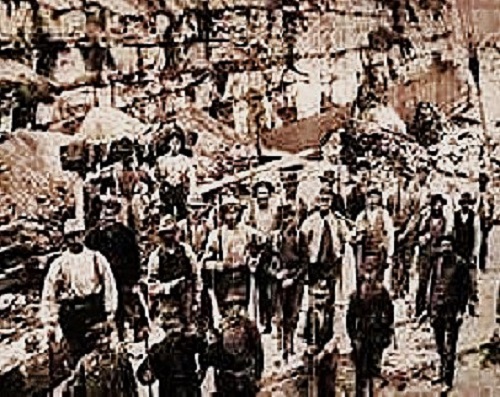Good enough to dig, not to vote

I think that there are few other topics these days that are more contentious than that of immigration. And like most other problems of our day, it is not new.
In 1836, it was the I & M Canal that was the cause of a wave of poor immigrants to flood our county. And like today, they were the victims of discrimination. Those damn dirty Irishmen!
The I & M Canal was started in 1836 with the goal of linking Lake Michigan to the Illinois River. It ran through thick muddy prairie soil, and hard, unyielding limestone. Technology was primitive, so most of the work was done by hand. And as the saying goes, there are three things needed to dig a ditch — a pick, a shovel and an Irishman.
The I & M Canal was built all sections at once, the work being contracted out. The contractors in turn were responsible for hiring the labor. Most of the laborers were single male Irishmen fresh off the boat. They lived in shanties along the canal in some of the worst conditions imaginable.
A Scotsman traveling along the route of the canal in 1840 wrote the following: “We had scarcely got beyond the edge of town before we came to a colony of Irish laborers employed on the Illinois Canal, and a more repulsive scene we had not for a long time beheld.
“The number congregated here were about 200, including men, women and children, and these were crowded together in 14 or 15 log huts, temporarily erected for their shelter. I never saw anything approaching the scene before us in dirtiness and disorder.
“For this, here at least, poverty could be no excuse, as the men were all paid at the rate of a dollar a day for their labor, had houses rent free, and provisions of every kind abundantly cheap. But whiskey and tobacco seemed the chief delights of the men.
“Of the women and children, no language would give an adequate idea of their filthy condition, in garments and person. It required only a little industry to preserve both in a state of cleanliness, for water was abundant in the river close at hand, and soap abundant and cheaper than in England. It is not to be wondered that Americans conceive a very low estimate of the Irish people generally.”
What that man did not know was that the dollar a day paid the laborers was in canal script, a kind of money put out by the Canal Commissioners, because they had run out of the real thing. Unfortunately, no merchants would accept this funny money, so it was as if they were not paid at all.
The locals also despised the Irish, frequently telling stories about drunkenness and debauchery. One story told by George Woodruff, Will County historian, about an Irish wake in which the living participants were so drunk that they lost the casket and its contents on the way from Lockport to the cemetery: “They went on their merry way unperturbed until they had to present something to the open grave. Then they retraced their steps, retrieved the remains of the principal participant and buried him.”
In addition, the Irish brought their own problems and prejudices with them. It seemed that those from County Cork in the south of Ireland, bitterly hated those from the north around Ulster. On July 4, 1839 a riot happened near Romeoville with the “Corkers” winning a victory. It only stopped when the sheriff from Juliet with a posse broke it up with clubs and guns.
The Irish however, were very much aware of the power of the vote. In 1840, this letter to the editor ran in the Juliet Courier: “To Irishmen – Fellow countrymen; Do you remember the meeting got up last August at the Court House? I was present and heard Wilson the canal candidate for representative, deal out up on us, the most unmeasured abuse. He said we were worse than savages, and more, he declared that we were more disgusting, and filthy than the hogs upon the public street, and a great deal more of the same kind of stuff. Fellow Irishmen! Countrymen! Ireland would disown you for the damning act of voting Republican. Pearson, Peck, Murphy, and Leary are democrats, and our friends. Vote no ticket which has not John Pearson at it head.”
It was at this election that Woodruff claims that each Irishman in the County voted 20 times, sweeping the Democratic Irishmen into office.
The hatred of the Irish continued unabated into the 1870s. In 1877, Alexander McIntosh, a former Wilmingtonian and editor of the newspaper in Joliet, the True Democrat, said this: “Ireland for years has been vomiting upon our shores the scum and excrescence of her bogs – her ragamuffin paupers and her wretched victims of squalid poverty, brutish ignorance and stolid superstition.
“In their native Isle they enjoyed and exercised no political rights – were a despised caste and were the blind devotees of Priestcraft; but when they put their foot upon American soil, they instantly are metamorphosed into brawling, insolent, menacing politicians.
“Not accustomed to exercise civil and political rights at home, they, in America, riot in excess of liberty and abuse the rights conferred upon them. They have become haughty, over-bearing and intolerant tyrants.”
McIntosh lost the election as the Irish Democrats were swept into office.
Sandy Vasko is Director of the Will County Historical Museum & Research Center and President of the Will County Historical Society.
